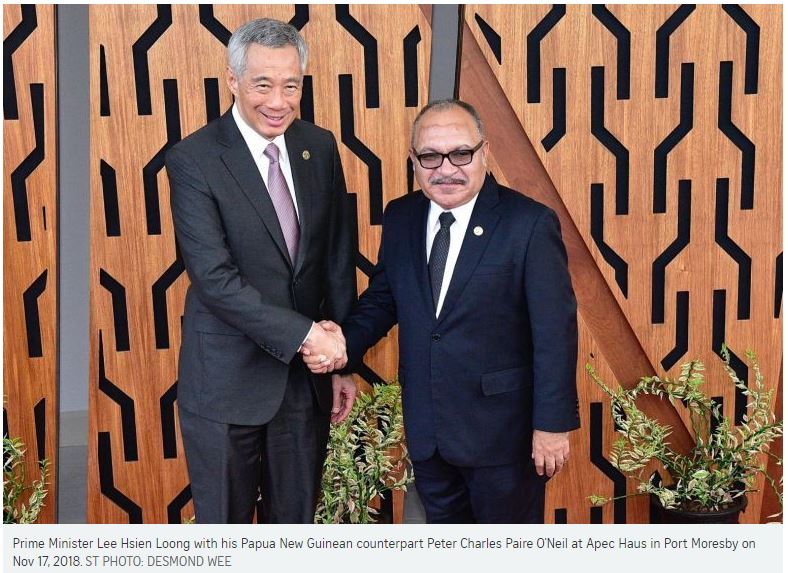Apec can set global direction on trade, do more in shaping rules for digital economy: PM Lee
PORT MORESBY – Leadership from a regional forum of Asia-Pacific economies is needed more than ever given mounting pressures against multilateralism and free trade, said Prime Minister Lee Hsien Loong.
“We can set the global direction and encourage others to follow our example of working together, rather than of going it alone,” he added.
Mr Lee spoke on Sunday (Nov 18) at a leaders’ retreat in the capital of Papua New Guinea, which is hosting the Asia-Pacific Economic Cooperation (Apec) summit. The leaders were discussing current global challenges and the future of digital economy in Apec.
Apec can do much more to shape progressive digital trade rules for emerging areas in the digital domain such as e-payments and digital identity, he said.
Mr Lee began his speech by congratulating Papua New Guinea for successfully hosting the annual summit.
He noted that Apec started in 1989 as an informal gathering of 12 like-minded economies that shared a vision of an integrated, vibrant and prosperous Asia-Pacific. The grouping now has 21 members.
The hope was that member economies could cooperate on a non-binding and voluntary basis to liberalise trade, he said, adding that Apec has succeeded in this core mission.
Citing how tariffs in Apec today are a third of what they were at its founding, he said the grouping has made steady progress towards the target goals of free trade and investment that were set in Bogor, Indonesia in 1994.
He called on fellow leaders to press on with efforts to form a Free Trade Area of the Asia-Pacific (FTAAP).
The FTAAP is a long-term goal to link Pacific Rim economies and harmonise various regional and bilateral free trade agreements.
Mr Lee said the Comprehensive and Progressive Agreement for Trans-Pacific Partnership (CPTPP), which will come into force in December, is an “encouraging development”.
The revised free trade pact between 11 nations, minus the United States, is seen as one of the pathways to the FTAAP.
Mr Lee also welcomed other complementary regional integration initiatives that can bring the world closer together.
Asean and six partner countries including Australia, China and Japan had agreed last week to reach a deal on the Regional Comprehensive Economic Partnership (RCEP) in 2019, a free trade pact that is seen as another pathway to the FTAAP.
Besides trade, Apec can also positively influence the emergence of the global digital economy, Mr Lee said.
He made the point that virtually every type of cross border transaction now has a digital component, such as data management, cybersecurity or internet connectivity.
Platform companies such as Alibaba and Amazon Digital are turning millions of small enterprises around the world into micro-multinationals, he said, exponentially increasing the number of participants in the digital economy.
But current trade rules have to be updated to address the increasing digitalisation of trade and accommodate more sophisticated transactions and consumers, he added.
For instance, new mechanisms to deal with cross border flows of data are needed, Mr Lee said.
At the same time, the mechanisms must allow for regulation to keep data secure and protect privacy.
Mr Lee said Japan, Australia and Singapore are co-convenors of a widely supported World Trade Organisation effort to develop new rules in e-commerce, which will provide business certainty and keep the e-commerce space open.
But Apec can do much more to advocate standards, he added.
“These progressive digital trade rules will support SMEs’ digitalisation efforts, and also facilitate investments by the big players, global digital companies,” he said, urging Apec leaders to press on with other initiatives to support businesses in adopting digital technologies.
“Our goal of a productive, innovative, and sustainable digital economy is entirely achievable,” he said.


 English
English




